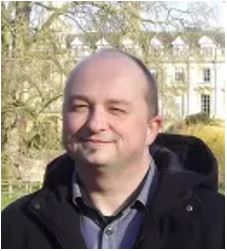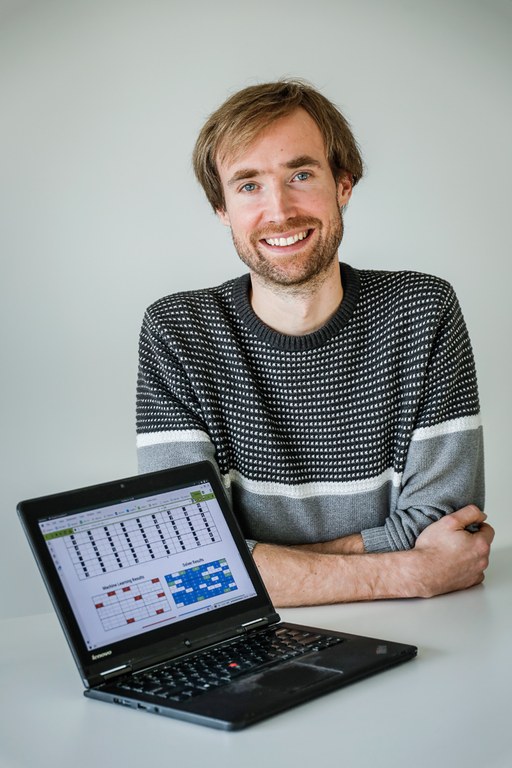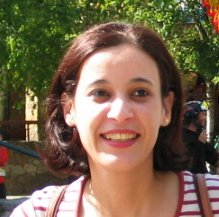Conférenciers invités à la PFIA

Franck Gechter
Université de Technologie de Belfort-Montbéliard – Laboratoire Connaissances et Intelligence Artificielle Distribuée
Titre : Du contrôle de véhicule autonome à l’optimisation de systèmes de transports : un retour d’expérience sur l’utilisation des systèmes multi-agents réactifs pour le contrôle/management de systèmes Cyber-Physiques.
Rencontres des Jeunes Chercheurs en Intelligence Artificielle (RJCIA) Jeudi 30-juin
Résumé :
Les approches agents, et en particulier les approches réactives d’inspiration physique ou biologique, possèdent maintenant une maturité suffisante pour pouvoir être utilisées dans le cadre d’applications réelles nécessitant le respect de contraintes opérationnelles fortes. Ainsi, l’application de telles approches à des problématiques de contrôle/management de Systèmes Cyber-Physiques (CPS) semble maintenant pertinente d’autant qu’elles permettent d’obtenir des propriétés d’adaptation, de robustesse, de stabilité, etc. particulièrement importantes dès lors que le système évolue dans un contexte dynamique et incertain.
L’objet de cette intervention est de présenter plusieurs approches de prise de décision, de contrôle et d’optimisation de véhicules autonomes et de systèmes de transport s’appuyant sur le paradigme des systèmes multi-agents réactifs d’inspiration physique et biologique. Au-delà des approches classiquement utilisées qui mettent généralement l’accent sur les primitives comportementales des agents, les approches présentées s’appuient principalement sur le rôle de l’environnement et des interactions dans l’obtention d’une organisation spatio-temporelle émergente. Dans le cadre du contrôle de véhicules cette organisation émergente est interprétée par des analyses qualitatives et quantitatives afin de construire une consigne à envoyer aux actionneurs des véhicules. Après une présentation des grands principes des approches, celles-ci seront illustrée par des mises en pratique sur des véhicules réels.
Biographie :
Après un Diplôme d'ingénieur de l'ENSPS et un DEA en photonique et traitement d'image de l'Université Louis Pasteur de Strasbourg en 1999, Franck GECHTER a obtenu sa thèse en Informatique à l'Université Henri Poincaré de Nancy en 2003. Il est actuellement professeur des Universités à l'Université de Technologie de Belfort-Montbéliard (UTBM) où il est rattaché au département Informatique. Ses activités de recherche sont menées au laboratoire Connaissance et Intelligence Artificielle Distribuée (CIAD) où il participe aux axes « Perception de l'environnement et navigation autonome » et « Systèmes Multi-Agents ». Il s'intéresse en particulier au traitement, l'analyse et la fusion de données multi-capteurs en utilisant des techniques liées à l'intelligence artificielle distribuée ou aux systèmes multi-agents. En outre, il s'intéresse à l'utilisation de modèles d'inspirations physique pour l'intelligence artificielle, la résolution distribuée de problèmes et la prise de décision. Franck GECHTER a particulièrement participé au projet CRISTAL (Cellule de Recherche Industrielle en Systèmes de Transports Automatisés Légers), au projet CATS (City Alternative Transport System - European Project 2012-2013) et au projet ANR VTT-2010 SafePlatoon. De 2012 à 2020, il est chercheur associé au Fuel Cell Laboratory (FCLab) (Fédération de laboratoires CNRS FR-CNRS 3539). Dans ce cadre, ses travaux concernent la simulation multi-niveaux et multi-physique de systèmes pile à combustible. En 2016 (1-26 février), il est invité en tant que « Academic Visitor » dans le Digital Technology Group du Computer Laboratory de l’Université de Cambridge (R.-U.). Actuellement, ses travaux se focalisent sur l’utilisation de l’intelligence artificielle pour la modélisation, la simulation et le contrôle des systèmes Bio-Cyber-Physiques c’est à dire des systèmes intégrant à la fois des dimensions Physiques (actionneurs, contrôle de l’énergie, capteurs…) Cybernétiques (Algorithmes de contrôle, prise de décision, interactions entre sous-systèmes…) et Humaines (interaction/intégration Humain Machine, ergonomie…). Afin de pouvoir collaborer de manière plus approfondie sur cette dernière dimension avec des collègues de l’Université de Lorraine, Franck Gechter est devenu également chercheur associé au LORIA en 2020.

Christian Bizer
Chair of Information Systems V: Web-based Systems, Director of the Institute of Computer Science and Business Informatics, Allemagne
Titre : Integrating Product Data from the Semantic Web using Deep Learning Techniques
Ingénierie des Connaissances (IC) Mercredi 29-juin
Abstract:
The adoption of schema.org annotations on the Web has sharply increased over the last years with hundreds of thousands of websites annotating information about products, events, local businesses, reviews, and job postings within their pages. In the talk, Christian Bizer will discuss the integration of schema.org product data from large numbers of websites for the use cases of building product knowledge graphs as well as comparing product prizes across e-shops. The key challenge for this integration is to determine which webpages describe the same product. Christian Bizer will demonstrate how this challenge can be handled by deriving a large pool of training data from schema.org annotations and using this data to train transformer-based product matchers. He will discuss how the matchers exploit the richness of the training data available for widely sold head products using multi-task learning but can also excel on matching long-tail products using contrastive pre-training as well as cross-language learning.
Biography:
Christian Bizer explores technical and empirical questions concerning the development of global, decentralized information environments. His current research focus is the evolution of the World Wide Web from a medium for the publication of documents into a global dataspace. Christian Bizer initialized the W3C Linking Open Data community effort which is interlinking large numbers of data sources on the Web. He co-founded the DBpedia project which derives a comprehensive knowledge base from Wikipedia. He also initialized the WebDataCommons project which monitors the adoption of schema.org, RDFa, JSON-LD, and Microdata annotations on the Web by analyzing large web crawls. His technical research focuses on the integration of data from large numbers of data sources and includes topics such as information extraction, identity resolution, schema matching, data fusion, and data search.

Jean François Puget
Ingénieur éminent, équipe Kaggle Grandmasters, NVIDIA, France.Titre : Applying Lessons From Kaggle Winning Solutions to Real World Problems
Applications Pratiques de l’Intelligence Artificielle (APIA) Jeudi 30-juin
Abstract:
Have you ever wondered what happens to Kaggle winning solutions after the competitions? Is there any truth in the myth that these winning solutions are just crazy stacks of ensemble with no real world value? Come join a Jean-Francois Puget to hear how Kaggle Grandmasters of NVIDIA (KGMON) team reuses their competition winning models and techniques for real world problems. He will discuss how they successfully transferred knowledge gained from dozens of competitions into NVIDIA internal and customer projects. How could a chemical formula prediction model be converted for grocery delivery route planning? Could NFL helmet detection models help video conference background removal? Which time series competitions are the most useful when building a sales forecasting model? Come and find out.
Biography:
Bio Jean-Francois Puget holds a Ph.D. in machine learning from previous millennium. After a detour into R&D on constraint programming and math programming at the ILOG company, then IBM, and over 70 scientific papers in peer-reviewed conferences and journals, Jean-Francois came back to machine learning few years ago. He entered Kaggle competition to refresh his knowledge of state-of-the-art machine learning practice, and still hasn't stopped. He's @CPMP on Kaggle, where he's a competition and discussion grandmaster, being in the top 10 in both categories. Jean-Francois now leads a team of Kaggle grandmasters at NVIDIA.

Hector Geffner
ICREA and Universitat Pompeu Fabra, Barcelona, Spain.
Linköping University, Linköping, Sweden.
Titre : Language-based representation learning for acting and planning
Journées Francophones Planification, Décision et Apprentissage (JFPDA) Vendredi 01-juillet
Abstract:
Recent breakthroughs in AI have shown the remarkable power of deep learning and deep reinforcement learning. These developments, however, have been tied to specific tasks, and progress in out-of-distribution generalization has been limited. While it is assumed that these limitations can be overcome by incorporating suitable inductive biases in neural nets, this is left vague and informal, and does not provide a meaningful guidance. In this talk, I articulate a different learning approach where representations are learned over domain-independent target languages whose structure and semantics yield a meaningful and strongly biased hypothesis space. The learned representations do not emerge then from biases in a low level architecture but from a general preference for the simplest hypothesis that explain the data. I illustrate this idea by considering three learning problems in planning: learning general actions models, learning general policies, and learning general subgoal structures ("intrinsic rewards"). In all these cases, learning is formulated as a combinatorial optimization problem but nothing prevents the use of deep learning techniques instead. Indeed, learning representations over domain-independent languages with a known structure and semantics provides an account of what is to be learned, while learning representations with neural nets provides a complementary account of how representations can be learned. The challenge and the opportunity is to bring the two together.
Reference: Target languages (vs. inductive biases) for learning to act and plan Hector Geffner. AAAI 2022. https://arxiv.org/abs/2109.07195
Biography:
Hector Geffner is an ICREA Research Professor at the Universitat Pompeu Fabra (UPF) in Barcelona, Spain, and a Wallenberg Guest Professor at Linköping University. He grew up in Buenos Aires and obtained a PhD in Computer Science at UCLA in 1989. He worked then at the IBM T.J. Watson Research Center in NY, USA, and at the Universidad Simon Bolivar, in Caracas. Hector is a Fellow of AAAI and EurAI, currently doing research on learning representations for acting and planning as part of the ERC project RLeap 2020-2025. He and his students received awards for papers published at JAIR and ICAPS, including three ICAPS Influential Paper Awards, and well before that, he received the ACM Dissertation Award. Hector teaches courses on logic, AI, and social and technological change.

Franco Zambonelli
Università degli Studi di Modena e Reggio Emilia, Dipartimento di Scienze e Metodi dell'Ingegneria,Italie.
Titre : From Smart to Autonomous (Cities, Homes, and Everything): Opportunities and Challenges
Journées Francophones sur les Systèmes Multi-Agents (JFSMA) Mardi 28-juin
Abstract:
In the near future, multitudes of autonomous decision making agents will pervade our everyday environments, to decide on our behalf the best way to increase our personal comfort, health, and security, or improve the efficiency, resilience and sustainability of our cities and their infrastructures. This will relieve us from the such duties and from the worry of thinking about them. Yet, ``with great power comes great responsibility'', and the goal of the talk is to reason about the challenges implied by assigning great (and often critical) decision power to pervasive autonomous systems. This includes technical challenges, to make sure to engineer autonomous systems capable of properly meeting our needs, of dynamically evolving to adapt to ever changing situations, and of dynamically learning how to interact with each other. But it also includes ethical, legal, and political challenges, to make sure such systems will be able to act and govern in accord to our guidance and in respect of our social norms.
Biography:
Franco Zambonelli is full professor of Computer Science at the University of Modena and Reggio Emilia. He got his PhD in Computer Science and Engineering from the University of Bologna in 1997. His research interests include: pervasive computing, multi-agent systems, self-adaptive and self-organizing systems, with applications to healthcare and smart cities. He has published over 130 papers in peer-reviews journals, and has been invited speaker at many conferences and workshops. He is in the editorial board of the ACM Transactions on Autonomous and Adaptive Systems, Springer-Nature Computer Science Journal, IEEE Society and Technology Magazine, the BCS Computer Journal, the Journal of Pervasive Computing and Communications. He has been scientific manager of the EU FP6 Project CASCADAS and coordinator of the EU FP7 Project SAPERE and of the PRIN 2017 Project Fluidware. He is ACM Distinguished Scientist, member of the Academia Europaea, IEEE Fellow, and has been recipient of the 2018 IFAAMAS Influential Paper Award.

Tias Guns
KU Leuven (Université de Louvain), DTAI lab, Belgium
Titre : Learning and Reasoning with Constraint Solving
Journées Francophones de Programmation par Contraintes (JFPC) - Lundi 27 juin
Abstract:
Industry and society are increasingly automating processes, which requires solving constrained optimisation problems. This includes vehicle routing, demand-response planning, rostering and more. To find not just optimal solutions, but also 'desirable' solution by the end user, it is increasingly important to offer tools that automatically learn from the user and the environment and that support the constraint modelling in interpretable ways.
In this talk I will provide an overview of three different ways in which part of the problem specification can be learned from data. This includes learning from the user (preference learning in VRP), learning from the environment (end-to-end decision focussed learning) and explanation generation, that sit at the intersection of learning and reasoning.
As part of this work, we are building a modern constraint programming language called CPMpy (http://cpmpy.readthedocs.io) that eases integration of multiple constraint solving paradigms with machine learning and other scientific python libraries. I will shortly highlight its possibilities beyond the above cases, as well as our larger vision of conversational human-aware technology for optimisation.
Biography:
Tias Guns is Associate Professor at the DTAI lab of KU Leuven, in Belgium. His research is at the intersection of machine learning and combinatorial optimisation.
Tias' expertise is in the hybridisation of machine learning systems with constraint solving systems, more specifically building constraint solving systems that reason both on explicit knowledge as well as knowledge learned from data. For example learning the preferences of planners in vehicle routing, and solving new routing problems taking both operational constraints and learned human preferences into account; or building energy price predictors specifically for energy-aware scheduling, and planning maintenance crews based on expected failures. He was awarded a prestigious ERC Consolidator grant in 2021 to work on conversational human-aware technology for optimisation.

Cédric Colas
Inria, France. lauréat du prix de thèse de l'AFIA 2022
Titre : Towards Vygotskian Autotelic Agents: Skill Discovery Powered by Linguistic Intrinsically Motivated Deep Reinforcement Learning
Mercredi 29 juin
Abstract:
How can artificial agents perform lifelong open-ended skill discovery? I will present some of my contributions towards this long-standing goal of AI. We first need autotelic agents, agents that are intrinsically motivated to represent, generate, pursue and master their own goals as a way to self-organize their developmental trajectories. These can be implemented within a developmental framework called intrinsically motivated goal exploration processes (IMGEP), itself adapted and extended to integrate modern deep reinforcement learning methods. In addition, I will argue that open-ended skill discovery may require language and sociality. Inspired by the work of Vygotsky and others, I will show how Vygotskian autotelic agents can leverage language as a cognitive tool to support the emergence of new cognitive functions such as systematic generalization, creative exploration and imagination.
Biography:
Cédric Colas (Inria) is a postdoctoral researcher working on the synergies between self-organized open-ended skill discovery processes and social interactions. He participated in the recent convergence of developmental robotics frameworks and modern deep reinforcement learning tools to build autotelic RL agents: intrinsically motivated agents that learn to represent, generate, pursue and master their own goals. With the Vygotskian Autotelic AI perspective, he argues for immersing autotelic agents in rich socio-cultural worlds, to let them extract knowledge from linguistic structures and content, and to build internal models of their social partners. He obtained his PhD under the supervision of Olivier Sigaud and Pierre-Yves Oudeyer at Inria and will soon start a postdoctoral position at MIT with Joshua Tenenbaum.
Contact: cedric.colas@inria.fr
GScholar ID: VBz8gZ4AAAAJ
Website: ccolas.github.io

Leila Amgoud
CNRS, IRIT, France.
Titre : Computational models of arguments
Conférence Nationale en Intelligence Artificielle (CNIA) - Mardi 28 juin
Abstract:
Argumentation is a reasoning approach based on the justification of claims by arguments, i.e. reasons for accepting claims. Due to its explanatory power, it has been used for solving various AI problems including handling inconsistency. Whatever the problem to be solved, an argumentation process follows generally four main steps: it justifies claims by arguments, identifies (attack, support) relations between arguments, evaluates the arguments, and defines an output. Evaluation of arguments is crucial as it impacts the outcomes of argument-based systems. Consequently, a plethora of methods have been proposed in the literature. In this talk, I will introduce abstract argumentation frameworks, various evaluation methods and an example of paraconsistent logic based on argumentation.
Biography:
Leila Amgoud is a senior researcher at the French National Centre for Scientific Research (CNRS), a member of the IRIT Lab in Toulouse, and a deputy director of the same lab. Before, she worked as a postdoctoral researcher at the University of Liverpool, United Kingdom. She holds a M.Sc. (1996), a PhD (1999) and an Habilitation `a Diriger des Recherches (2009) in Computer Science from the Paul Sabatier University, Toulouse, France. She is currently an Associate Editor of the Artificial Intelligence Journal and the Journal of Argument and Computation, and she serves as area chair and senior program committee member of the main conferences on Artificial Intelligence. She has been honoured with a prestigious EurAI (previously called ECCAI) fellowship since 2014. The research interests of Leila Amgoud are centered around knowledge representation and reasoning. She is specifically interested in explanation-based (or argumentation-based) approaches for reasoning under uncertainty. She holds a chair on "argumentation" at Artificial and Natural Intelligence Toulouse Institute.